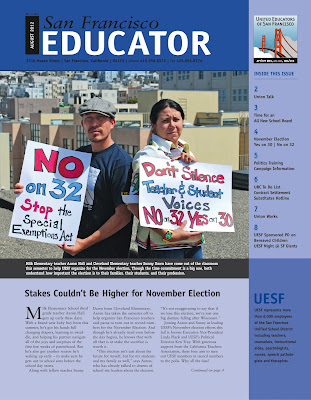Have Fun with this Political Sing Along!
"One Term More"
A new contract for teachers in San Francisco that limits the number of furlough days for educators is heavily contingent on voters approving one of two November tax measures.
The contract, which was tentatively agreed to Aug. 1, was approved by United Educators of San Francisco members Monday night and unanimously ratified by the seven-member Board of Education on Tuesday. Seventy percent of the 1,456 union members who voted approved of the contract that emerged from intervention by a state mediator and a threatened strike.
Under the new agreement, the school year in the San Francisco Unified School District, which started Monday, will be 179.5 days. That is up from the 176 in the district’s budget approved in June. That budget approved $597 million in expenditures based on income from federal, state and local sources projected to be just $567 million, leading the district to dip into reserves.
The budget passed by the Board of Education included nine furlough days for teachers and expanded class sizes for kindergarten through third grade, starting in the 2013 school year.
The unpaid days and larger class sizes were a point of contention for members of the teachers union, leading to loggerheads in spring negotiations and resulting in the deployment of a state mediator. Those sticking points also led to a May vote by union members to authorize a strike.
United Educators spokesman Matthew Hardy said the goal of the teachers was to keep the cuts away from classrooms. Instead of furlough days and larger class sizes, which would affect students, teachers instead authorized spending cuts for retention bonuses and other stipends, many of which will hit educators in the wallet, Hardy said.
But the protected school days could still be at risk if voters do not approve at least one of two tax measures on the November ballot. Propositions 30 and 38 both ask voters to approve new tax measures, and each would steer funds to public schools. UESF is asking its members to support Prop. 30, the measure put on the ballot by Gov. Jerry Brown.
If Prop. 30 is approved, schools across the state will receive more funds than currently budgeted. If the proposition fails, the district stands to lose as much as $24 million. Under the new contract, union members will take an additional furlough day for each $1.79 million the district loses.
“This settlement is a wake-up call to all parents and school supporters,” union President Dennis Kelly said in a written statement about the importance of passing Prop. 30. “We must do everything we can to help pass this initiative and keep our kids in school.”
mbillings@sfexaminer.com
The contract, which was tentatively agreed to Aug. 1, was approved by United Educators of San Francisco members Monday night and unanimously ratified by the seven-member Board of Education on Tuesday. Seventy percent of the 1,456 union members who voted approved of the contract that emerged from intervention by a state mediator and a threatened strike.
Under the new agreement, the school year in the San Francisco Unified School District, which started Monday, will be 179.5 days. That is up from the 176 in the district’s budget approved in June. That budget approved $597 million in expenditures based on income from federal, state and local sources projected to be just $567 million, leading the district to dip into reserves.
The budget passed by the Board of Education included nine furlough days for teachers and expanded class sizes for kindergarten through third grade, starting in the 2013 school year.
The unpaid days and larger class sizes were a point of contention for members of the teachers union, leading to loggerheads in spring negotiations and resulting in the deployment of a state mediator. Those sticking points also led to a May vote by union members to authorize a strike.
United Educators spokesman Matthew Hardy said the goal of the teachers was to keep the cuts away from classrooms. Instead of furlough days and larger class sizes, which would affect students, teachers instead authorized spending cuts for retention bonuses and other stipends, many of which will hit educators in the wallet, Hardy said.
But the protected school days could still be at risk if voters do not approve at least one of two tax measures on the November ballot. Propositions 30 and 38 both ask voters to approve new tax measures, and each would steer funds to public schools. UESF is asking its members to support Prop. 30, the measure put on the ballot by Gov. Jerry Brown.
If Prop. 30 is approved, schools across the state will receive more funds than currently budgeted. If the proposition fails, the district stands to lose as much as $24 million. Under the new contract, union members will take an additional furlough day for each $1.79 million the district loses.
“This settlement is a wake-up call to all parents and school supporters,” union President Dennis Kelly said in a written statement about the importance of passing Prop. 30. “We must do everything we can to help pass this initiative and keep our kids in school.”
mbillings@sfexaminer.com
Classroom implications
A new teachers contract is heavily dependent on measures on the November ballot.
If either Prop. 30 or Prop. 38 passes
SFUSD would begin reversing cuts, starting with furlough days, for every additional $1.79 million in extra funding above current revenue projections
If Prop. 30 and Prop. 38 fail
Union members will take an additional furlough day for every $1.79 million the district losses
Up to five of the furlough days would be in 2012-13 school year
Up to an additional 8.5 furlough days would be in 2013-14 school year
Source: United Educators of San Francisco




